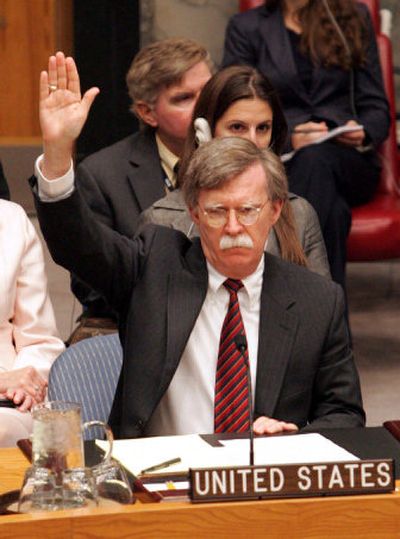Bolton’s future in U.N. post uncertain

WASHINGTON – President Bush’s nomination of John Bolton as ambassador to the United Nations appears increasingly endangered in the Senate, prompting the administration to explore other ways to keep him in the job after his temporary appointment expires in January, officials said Wednesday.
The situation represents a sharp turnaround from two weeks ago, when the White House was confident it could finally push through Bolton’s long-stalled nomination. But last week’s surprise move by Sen. Lincoln Chafee, R-R.I., to delay a vote convinced Republicans on Capitol Hill that the nomination may be doomed, prompting a search for alternatives.
Administration officials said they have not given up. Secretary of State Condoleezza Rice called Chafee on Wednesday to kick off a lobbying campaign that will continue today when he returns to Washington after his hard-fought Republican primary victory in Rhode Island on Tuesday. Bush and national Republicans pulled out the stops to help Chafee win the primary, and they expect a payback. But with Chafee now preparing to face a strong Democratic challenger in a Democratic state in November, many Republicans said he has less incentive to support a firebrand figure such as Bolton.
“It’s dead as far as the Senate is concerned,” said one Republican official at the Senate Foreign Relations Committee, where Chafee holds the decisive vote. “Chafee made it a 9 to 9 vote, and that’s not going to change.” A Senate Republican leadership aide added: “Chafee holds Bolton’s future in his hands, and people are very worried he’s going to squeeze and never let go.”
White House officials said that assessment is premature. “John Bolton’s been a tireless advocate for the United States at the U.N.,” said White House spokeswoman Dana Perino. “We continue to be confident he’ll get the up-or-down vote he deserves, and it remains our goal that the vote would happen before the recess.”
Another failed nomination would be a stinging defeat for Bush, who defied Senate opposition last year and installed Bolton at the United Nations on an interim basis with a recess appointment. That appointment will end in January unless the Senate votes to confirm him before adjourning for the year.
The battle over Bolton has been a defining struggle that has put the Bush administration’s often brash style of foreign policy to the test. Bolton, who served as undersecretary of state in Bush’s first term, has been a lightning rod among diplomats, Democrats and some Republicans because of his outspoken, tough-minded approach to issues such as Iran, the Middle East and the United Nations itself.
But in the 13 months since he was sent to New York, Bolton has surprised some critics with a more consensus-building style than they expected. Sen. George Voinovich, R-Ohio, who played a central role in the blocking of the nomination last year, reversed course this summer, declaring himself impressed by Bolton’s performance – seemingly clearing the way to confirmation.
Chafee put a halt to that last week by saying he would not vote for Bolton until after the administration addresses questions on Middle East policy that he had sent in a letter to Rice. Taken aback, White House officials hoped that it was merely a tactic to put off a controversial vote until after the primary, while preparing contingencies in case it was not. Even with a “no” vote from Chafee, the Foreign Relations Committee could send the nomination to the floor on a tie vote, but Republicans would probably face a Democratic filibuster.
Bush has the power to give Bolton a second recess appointment, but under the common interpretation of federal law, Bolton could not be paid. Even if Bolton were willing to serve as a volunteer ambassador, officials said, the move could run afoul of another federal law that bans full-time employees from working without compensation.
Another possible option might be an appointment as “acting” ambassador. When the confirmation of President Bill Clinton’s nominee for civil rights chief at the Justice Department, Bill Lann Lee, was blocked, Clinton appointed him deputy assistant attorney general, a posting that does not require Senate approval, and then had Lee fill in as “acting assistant attorney general.” Acting officials are supposed to serve no more than 210 days, but Lee spent 21/2 years in the post without Senate consent.
Such a move could provoke a Senate that zealously guards its prerogatives. “I don’t think John Bolton has too many options but to go home,” said Paul Light, a governance scholar at the Brookings Institution. “At some point, he has to decide whether he has to go.”
Chafee’s office said he has not decided how to vote. But an adviser outlined the difficult choice: “Politically it’s a no-win for the senator. He votes against it, and he hurts the Republicans who just helped him in a primary in a very, very tight race. … And he votes for it, he hurts himself with the Democrats that he needs in November.”